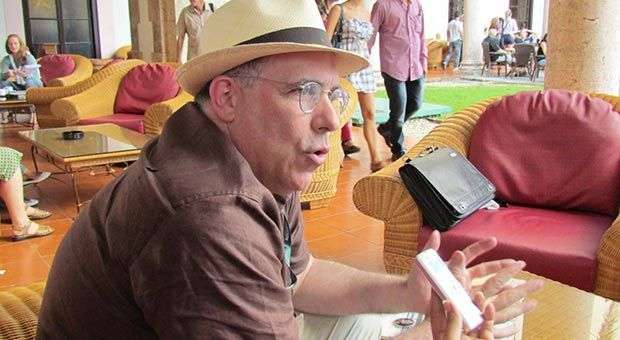How to make a movie? That could be the big question that keeps awake for more than three decades to William Horberg, successful Hollywood producer who by these days is involved in the 35th International Festival of New Latin American Cinema in Havana.
Bill Horberg offered on Monday December 9 a keynote lecture at the Hall 1930 of the Nacional Hotel. His “first experience of this kind,” he told OnCuba moments before starting the conversation, which main objective was the work of the producer within the process of conducting a film, an area in which the Californian has extensive experience with unforgettable titles like Cold Mountain, The Godfather III, Ghost, etc .
The meeting, offered as part of the Havana Festival, was essentially on his work as independent producer heading the company Wonderful Films, which he owns.
After starting with the Paramount Pictures and becoming there one of the Vice Presidents of Production, in 1991 Horberg followed his own vision that led him to create his own company.
Wonderful Films is not just a name, he says, is also a concept, his concept, of excellence to which he aspires when deciding to produce a film: a great script, a great director, a great cast and, of course, a budget that can hold all that.
According to Horberg, the real work of the producer is to maintain dialogue and communication between these four factors. He adds also that his formula to make an interesting movie is to find the midpoint in which joining together the story the director wants to tell and the film that he dreams can come out of that story.
It is apparently a successful formula when considering the 30 feature films produced during his career, many of which have won awards in different countries and festivals, in addition to recognition within the United States….
In addition, in the conference he talked about issues like globalization and marketing in Hollywood production. Among the data handled by Horberg were the 677 movies that came to light in the past 2012, the majority of which have low quality or are full of and banality.
Around this issue Bill showed a fragment of the animated film Wall-E (2008), produced by Pixar Studios, taking it as sample of what can be a very popular film without giving up telling a beautiful story, with a good script and a clear message.
Talking with William Horberg
How did your relationship with Cuban cinema begin?
“My wife is Cuban, we met each other here in 2000 when I came to the Jazz Festival and it was also the time of the Havana Biennial and the Film Festival. That was my first trip to the island but I enjoy Cuban cinema through Tomás Gutiérrez Alea and other films with which I was familiar. “
From your experience as producer, what do you think about Latin American proposals?
“It’s very fresh, alive. The Brazilian, Mexican, Chilean, Argentinean films have strong voices, are culturally specific and can reach audiences worldwide. And of course, Cuban contemporary cinema also has the ability to reach and connect people from different regions. “
In the specific case of Cuba, would you dare to produce a Cuban film?
“I would love to produce a Cuban film. Unfortunately today it is still illegal for me. But my dream in the future is that these barriers to fall and I could work here. Because Cubans have a strong spirit and a very specific and attractive sense of humor, the locations are amazing. But of course it is very difficult to be involved in a production from the United States. “
We insisted again, because there is not an interested producer every day. He laughs and says with a grin:
“Here, maybe I could produce a love story, it’s the atmosphere , and it seems very likely. I like movies in all colors, shapes, but I’m fascinated by real human stories that do not follow a particular route, try to be creative to tell stories in a different way. “
What essential differences do you see between Hollywood and Latin America ways of production?
“I’ve never produced a film in Latin America; perhaps the problems of making a film are the same everywhere. I have traveled and filmed through different countries, I have known producers and directors worldwide. We always have things in common: seek funding difficulties, the challenges of dealing with great personalities, tensions. “
Cuba and its cinema, how much has it changed and what expectations do you think it has to be inserted into the global marketplace?
“I’m here to learn from Cuba and its films, what happens today, see the stories that are being told. I can not offer an expert opinion, I’m here as someone who is keen to observe, learn. I think it’s always important to stay faithful to who you are, be honest with the authenticity of the culture to which you belong.
“And by being specific, those stories are genuine, universal and tend to travel and people recognize it and think: Ah, Cuba is not different, strange, mysterious; because we recognize what we have in common as human beings.”










